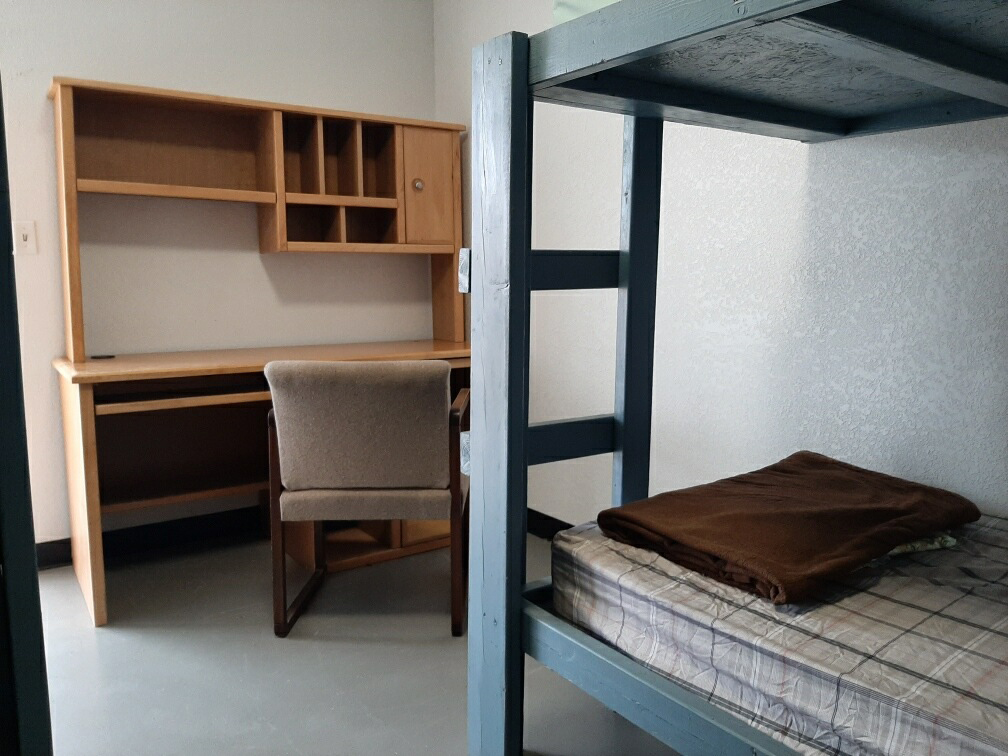
James Shipp/Carlsbad Transitional Housing
.
“On call” means something different these days for Johnnie Bradford. As the longtime housing supervisor for Carlsbad Transitional Housing, she has always been available anytime day or night, but the coronavirus outbreak means she can’t visit the residents in person like before.
“I’m on call 24 hours a day for any needs that they might have. I’m also doing phone conferences with everyone at least once a week. I’ve been on the phone with one client today about four times,” Bradford said.
Like every essential business in New Mexico, Carlsbad Transitional Housing and Emergency Shelter, which offers long-term housing and short-term shelter services for at-risk populations, including foster youth and families, has adjusted to the COVID-19 pandemic. Everyone involved has been challenged, ranging from the staff to the populations the nonprofit organization serves. The only transitional housing program in Eddy County remains an important rock in the community during the coronavirus outbreak.
No matter what is happening in the world, Bradford says the organization demands a lot from the residents who are fortunate enough to be accepted into the program. A dedicated team of staff and volunteers are there for each resident from start to finish.
“This isn’t a handout. It’s more of a hand-up,” she said. “We’ll be there besides you as long as you follow the rules. If you work hard, we’ll work just as hard with you.”
How the program works
The housing portion of Carlsbad Transitional Housing began in 1999 while the emergency shelter opened in May 2016. Both programs are supported by 13 different area churches, all operating under different denominations. “All of them work together,” Bradford said. “It’s really something to see.”
The nonprofit owns four houses scattered throughout the community that they’ve bought one by one over time. (Another home is lent for free from the Carlsbad First Assembly of God Church.) Applicants to the housing program, where there’s currently a waitlist, must meet stringent requirements — whether that’s working a full-time job, carrying a full load of classes each semester or a combination of the two — to even be considered for program eligibility. Housing services are open to any age group. (Minors must be accompanied by a parent.)
Once accepted, residents are required to work with a mentor who helps with life skills and financial planning. Carlsbad Transitional Housing pays the first $100 of the monthly utilities, and a sliding-scale rent price is negotiated that’s based upon a person’s situation.
“It’s individualized. We try to keep them in the program for about 12 months and our goal is for them to be self-sufficient by the time they leave,” Bradford said. “We want people who are motivated and really use the year productively. You just don’t get a house. You get the whole program.”
The housing program maintains long-time partnerships with the Carlsbad Battered Families Shelter, Jonah’s House Food Pantry, Carlsbad Municipal Schools and the Children, Youth and Families Department (CYFD), which sometimes refers parents who are trying to get their children back from foster care because they need a stable living situation.
According to Bradford, Carlsbad Transitional Housing doesn’t receive any federal dollars. The organization is entirely funded by donations and volunteers.
[Related: New Mexico Tribal, State Leaders Pulling Together Against Pandemic]
[Related: For New Mexican, Tribal Leaders, It’s ‘All Hands on Deck’ in 2 Counties]
[Related: Newly Updated Technology Helps CYFD Stay in Touch]
[Related: Las Cruces Case Worker Helping Youth Who Have Aged Out of Care Plus the System-involved]
“We have generous people in Carlsbad and businesses that have helped us financially through grants and outright donations,” she said. “We’ve received donations as small as $5 and as large as $5,000. All of those are very important.”
The coronavirus outbreak has impacted at least one resident, she said. A father was laid off from his job and the family is adjusting to the current new normal each day.
“He’s trying to help them with homework,” Bradford said. “He’s very confident and doing a good job, but it’s a challenge. With the virus, it’s a challenge for all of us.”
Shelter seeing fewer people
The coronavirus scare is also impacting the emergency shelter at Carlsbad Transitional Housing, which operates an eight-room, 32-bed shelter (with the ability to accommodate more). People can stay for up to seven days, which can be extended depending upon circumstances.
“It’s really ironic. We don’t see as many people as before the pandemic. I just don’t know where everybody has gone,” said James Shipp, shelter manager. “I don’t know if people have resolved their differences with family members, but we don’t see as many people. With social distancing, things have slowed down for us.”
Shipp is especially concerned with the homeless population, which has included foster youth and teenagers without parents, who normally come for shelter services. He estimates that about 60% of the shelter’s population face mental health challenges.
“It’s really sad because we really try to do the best that we can,” Shipp said. “Regardless of anyone’s situation, as human beings we all need a roof over our heads. That’s a real heartache when you’re dealing with the homeless.”
The moratorium on human contact has also been a considerable test for the staff and volunteers at Carlsbad Transitional Housing, but Bradford says everyone is making adjustments.
“We’ve very warm and loving people and we’re having to keep our distance,” he said. “We’re having to be more verbal with our encouragement.”
This story is part of a Youth Today project on foster care in New Mexico. It’s made possible in part by the May and Stanley Smith Charitable Trust. Youth Today is solely responsible for the content and maintains editorial independence.































